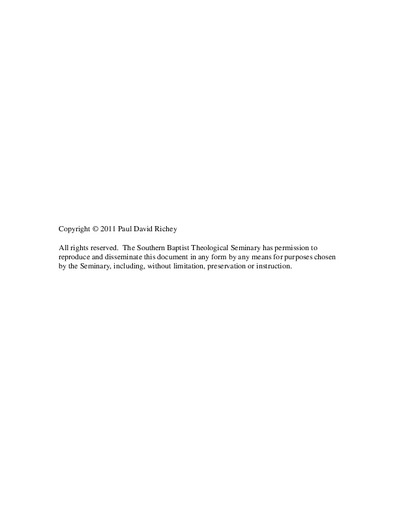Developing a Strategy for Personal Evangelism at Otter Creek First Baptist Church in Little Rock, Arkansas
Abstract
Chapter 1 highlights the ministry context at Otter Creek First Baptist Church in Little Rock, Arkansas. In explaining the context of ministry, this chapter focuses on the history of the church, as well as, the current environment. There is an interweaving of the history and the current situation in order to show the role that history has played to create the current dynamics. Due to the unique physical setting of the church, a focus is given to the community that surrounds the church by analyzing an up to date demographics study. Chapter 1 includes a description of the goals and rationale for the project.
Chapter 2 focuses on the biblical and theological groundwork for this project. To fully grasp the command of the Great Commission, the commissioning passages found in the gospels, as well as, Acts 1:8 are examined. In addressing the concept of fluid evangelism, this chapter looks at Acts 17:22-34; Acts 26; 1 Corinthians 9:22-23; and Galatians 1:6-10. Through these passages the focus is upon the concept of various methods being used to present the same unchanging gospel. Chapter 2 also addresses accountability partners.
Chapter 3 focuses on the various outside sources that pertain to the concept of fluid personal evangelism though personal covenants. To achieve the goal, this chapter contains content that focuses on various methodologies to sharing one's faith with another. It lays the ground work for some key apologetical uses within sharing and defending one's faith. This chapter centers on the interaction between various methods of evangelism and the ability to uses several methods at any given time to share the gospel.
Chapter 4 depicts the project's set up. By outlining the project in detail and sharing the process that is followed, this chapter allows someone to duplicate what has been done at Otter Creek First Baptist Church. This chapter shows the transition from theory and theology to practical application.
Chapter 5 is a chapter of intense evaluation. The evaluation is a summation of the surveys that will be given and personal feedback that will come through the weekly meetings. Chapter 5 addresses the fulfillment of failure of the goals set forth at the beginning of the project and examine whether or not the church has matured in its faith.

